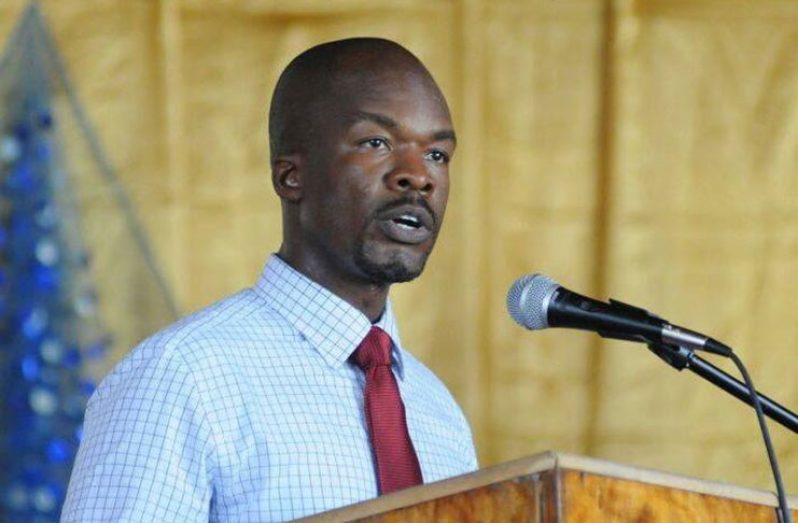– psychologist looks at GDF captain after shooting death of wife
PSYCHOLOGIST Wil Campbell is appealing to the Joint Services to provide psychosocial support to its members, pointing out that domestic violence results from social learning and poor problem-solving skills.
He shared this view in the aftermath of the murder of travel agent Reona Payne, a mother of three, by her reputed husband, former army Captain Orwain Sandy.
Sandy, who served as the Special Assistant to the Chief-of-Staff of the Guyana Defence Force (GDF), on Saturday last emptied his gun on his reputed wife in First Street, Alexander Village, Georgetown.
After committing the act, he surrendered to police at the Ruimveldt Police Station.
“I am appealing for the Joint Services, in particular, to provide psychosocial support in a systematic way, make it a matter of policy to provide strengthened systematic support for their personnel. When you train people and give them all this power and they have unresolved issues: that’s a recipe for disaster and I suspect that is why we have so many issues coming out of the Joint Services,” the psychologist said.
He explained that military people and people in power in general, including men in the household, do not understand the purpose of power and they misuse it.
Power, he said, should be channeled towards resolving issues.
Campbell said a resolution to violence against women and children, needs to start with people learning to apply power and understanding that power only equips an individual to perform a function and not to control others.
Emphasising that social, psychological, problem-solving and conflict resolution skills are needed, the psychologist said women are raised to think they are subservient and have to be willing participants in patriarchy.
He explained that many women believe that they cannot survive without a man, or if they are left alone they are no good enough for anyone else.
“The entrapment and trapped feeling that they can’t leave because they can’t go back home, or make it on their own and that people won’t believe them are challenges faced by women.
“I think the legal system is also a contributor, both at the legislative and enforcement. I think we need to strengthen legislations so that someone does not have to testify against an abuser. If a neighbour witnesses an abuse and is willing to give evidence then that case should not be thrown out because the victim does not want to testify.
“I also feel that if a victim reports violence they should not be allowed to withdraw that report, and there must be some way that the perpetrator can be prosecuted whether or not the victim wants to prosecute or not,” Campbell said.
LEARNED BEHAVIOUR
The psychologist explained that boys learn from watching their fathers beating their mothers (and vice versa) or from their parents beating them, that violence is an acceptable (or at least useful) means of getting others to comply.
Campbell noted that girls learn via the same means, that it is normal for the more powerful party to inflict violence; hence, being a victim is normalised.

In some cases, he said the perpetrators of domestic violence were not raised in violent situations. However, because they never learned how to deal with emotionally challenging situations or interpersonal conflict, they become frustrated and resort to violence.
Further, he asserted that violence against women is a manifestation of unequal power relation between male and female, leading to discrimination against the women by men and the prevention of the full-advancement of women.
The psychologist underscored that the intentional use of physical force, threatened or actual, against oneself, another person, or a group or community, either results in, or has a high likelihood of resulting in injury, death, psychological harm, mal-development or deprivation.
He said violence against women is a global issue as many women are neglected and trapped within cultural framework, molded by a patriarchal system.
As a result, violence against women is viewed as a normal phenomenon in the light of male attitudes, he added.
In a study done by Help and Shelter, it was noted that in Guyana, jealousy is a common theme in domestic violence scenarios, with women often being portrayed as devious and sexually promiscuous.
Although reliable national statistics are not readily available, the study noted that it is well accepted that Guyanese women continue to be subject to widespread violence that prevents them from enjoying other constitutionally-ensured rights.
“The landscape has not changed much since then. This does not mean that significant work is not on-going at the national and community levels, or that the efforts of dedicated activists and social workers are not making a difference in the lives of many women,” the study noted.
“We are still struggling to address the fundamental question of how to effect the kind of societal change needed to eliminate domestic violence in Guyana. This type of change can only occur through collaboration across sectors, government, civic and donor organisations, and with the sustained political will necessary to implement a long-term and coherent plan of action,” the Help and Shelters study underscored.
Meanwhile, a US report on human rights practices for 2015, has highlighted the shortcomings in Guyana, describing the domestic violence situation here as widespread.
“Domestic violence and violence against women, including spousal abuse, was widespread. The law prohibits domestic violence and allows victims to seek prompt protection, occupation, or tenancy orders from a magistrate,” the US Department of State report highlighted.
Survivors, frequently, were unwilling to press charges due to a lack of confidence in obtaining a remedy through the courts. Some preferred to reach a pecuniary settlement out of court, it added.
According to the US State Department, there were reports of police accepting bribes from perpetrators and other reports of magistrates applying inadequate sentences after conviction.




.png)









